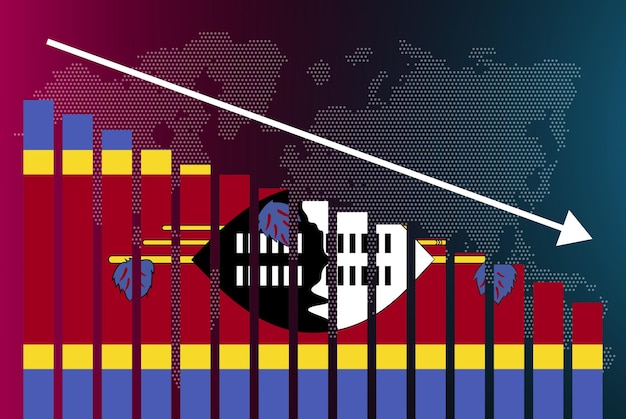Investing in Emerging Markets: Understand the Risks and Opportunities

Investing in emerging markets presents both significant opportunities for high returns and substantial risks due to economic and political instability, currency fluctuations, and regulatory challenges, requiring a well-informed and diversified investment strategy.
Exploring opportunities in emerging markets can be an exciting prospect for investors seeking high growth potential. However, understanding the inherent risks is crucial for making informed decisions. This article delves into the world of investing in emerging markets: risks and opportunities, providing insights to navigate this dynamic landscape.
What Are Emerging Markets?
Emerging markets are nations with developing economies that are undergoing rapid growth and industrialization. These markets often present higher growth potential compared to developed countries, making them attractive investment destinations. However, they also come with increased volatility and risks.
Understanding the characteristics of emerging markets is essential for any investor considering allocating capital to these regions. Factors such as political stability, regulatory frameworks, and economic policies play a significant role in shaping the investment landscape.
Key Characteristics of Emerging Markets
Emerging markets share several common traits that distinguish them from developed economies. These characteristics influence the investment strategies and risk management approaches required for success.
- Rapid Economic Growth: Often experience faster GDP growth rates than developed nations.
- Increasing Disposable Income: Rising incomes lead to increased consumer spending and investment opportunities.
- Developing Infrastructure: Investments in infrastructure projects such as roads, railways, and energy are common.
- Political and Economic Reforms: Undergoing reforms to improve governance and attract foreign investment.
Investors must carefully assess these characteristics to identify markets with the most promising potential and mitigate associated risks. Diversification across multiple emerging markets can further reduce exposure to specific country risks.

Potential Benefits of Investing in Emerging Markets
Investing in emerging markets offers several potential benefits that can enhance portfolio diversification and returns. These benefits stem from the unique economic and demographic dynamics of these regions.
One of the primary advantages is the opportunity to tap into high growth rates that often outpace those of developed economies. Additionally, emerging markets can provide access to new markets and industries, diversifying investment exposure.
Higher Growth Potential
Emerging markets often exhibit higher growth potential due to factors such as expanding populations, increasing urbanization, and rising middle classes. This growth can translate into higher returns for investors.
The expansion of local industries and the adoption of new technologies also contribute to the growth potential of these markets. By investing in these trends, investors can position themselves to benefit from long-term economic development.
Diversification Benefits
Including emerging markets in a portfolio can enhance diversification by reducing correlation with developed market assets. This diversification can help to mitigate risk and improve overall portfolio performance.
The unique economic cycles and market dynamics of emerging markets can provide a hedge against downturns in developed economies. This can lead to more stable and consistent returns over time.
Understanding the Risks Involved
While investing in emerging markets presents attractive opportunities, it is essential to understand the inherent risks involved. These risks can significantly impact investment returns and require careful consideration.
Some of the key risks include political and economic instability, currency fluctuations, regulatory challenges, and liquidity constraints. Investors must thoroughly assess these factors before allocating capital to emerging markets.

Political and Economic Instability
Political instability, including corruption, policy changes, and geopolitical tensions, can significantly impact investment returns in emerging markets. Economic instability, such as high inflation and debt levels, poses additional risks.
Investors should carefully monitor political and economic developments in each market and assess the potential impact on their investments. Diversifying across multiple countries can help to mitigate exposure to specific political and economic risks.
Currency Fluctuations
Currency fluctuations can significantly affect the value of investments in emerging markets. Devaluations can erode returns, while volatile exchange rates can create uncertainty.
Hedging currency risk can be a strategy to mitigate the impact of currency fluctuations. However, hedging can also add costs and complexity to the investment process.
Strategies for Managing Risk
Effective risk management is crucial for successfully investing in emerging markets. By implementing appropriate strategies, investors can mitigate potential losses and enhance returns.
Diversification, due diligence, and active management are key components of a robust risk management framework. Understanding the unique characteristics of each market and tailoring investment strategies accordingly is also essential.
- Diversification: Spreading investments across multiple countries and asset classes.
- Due Diligence: Conducting thorough research and analysis before investing.
- Active Management: Monitoring investments closely and adjusting strategies as needed.
How to Choose the Right Emerging Markets
Selecting the right emerging markets for investment requires careful analysis and evaluation of various factors. These factors include economic indicators, political stability, regulatory environment, and market liquidity.
Investors should also consider their risk tolerance and investment objectives when choosing emerging markets. Some markets may offer higher growth potential but also come with greater volatility and risk.
Economic Indicators
Key economic indicators such as GDP growth, inflation rates, and unemployment levels can provide insights into the health and potential of emerging markets. Strong economic fundamentals are generally indicative of favorable investment conditions.
Investors should also monitor factors such as trade balances, fiscal deficits, and debt levels to assess the sustainability of economic growth. Markets with sound fiscal policies and stable economic conditions are typically more attractive for investment.
Political Stability and Regulatory Environment
Political stability and a transparent regulatory environment are essential for attracting foreign investment and supporting economic growth. Markets with stable political systems and clear regulatory frameworks tend to be more predictable and less risky.
Investors should also assess the level of corruption and the rule of law in each market. Countries with high levels of corruption and weak legal systems may present greater risks to investment.
The Role of Due Diligence
Due diligence is a critical step in the process of investing in emerging markets. It involves conducting thorough research and analysis to assess the potential risks and opportunities associated with each investment.
Effective due diligence includes evaluating financial statements, conducting site visits, interviewing management teams, and assessing the competitive landscape. It also involves understanding the regulatory and political context of the investment.
Financial Analysis
Analyzing financial statements is crucial for assessing the financial health and performance of companies in emerging markets. Investors should carefully review balance sheets, income statements, and cash flow statements to identify potential risks and opportunities.
Key financial ratios such as debt-to-equity, return on equity, and price-to-earnings can provide valuable insights into the financial stability and profitability of companies.
Operational Review
Conducting an operational review involves assessing the company’s business model, competitive position, and management team. This can provide insights into the sustainability of the company’s performance and its ability to generate future growth.
Investors should also evaluate the company’s operational efficiency, supply chain management, and customer relationships to identify potential risks and opportunities.
| Key Aspect | Brief Description |
|---|---|
| 🚀 Growth Potential | Higher GDP growth compared to developed markets. |
| ⚠️ Risks Factors | Political instability, currency volatility can impact investments. |
| 🌍 Diversification | Opportunity to diversify portfolio and reduce risk. |
| 🔍 Due Diligence | Thorough research needed before investing. |
FAQ
▼
Emerging markets are countries with developing economies showing rapid growth, industrialization, and potential for higher investment returns compared to developed nations.
▼
The main benefits include higher growth potential, diversification opportunities, access to new markets, and the chance to capitalize on rapidly expanding industries.
▼
Key risks include political and economic instability, currency volatility, regulatory challenges, liquidity constraints, and potential for corruption.
▼
Strategies include diversification across multiple countries, thorough due diligence, active portfolio management, and hedging currency risk to mitigate potential losses.
▼
Investors should evaluate economic indicators, political stability, regulatory environment, market liquidity, and their risk tolerance before allocating capital to emerging markets.
Conclusion
Investing in emerging markets requires a comprehensive understanding of both the potential benefits and inherent risks. By conducting thorough due diligence, implementing robust risk management strategies, and carefully selecting markets based on economic indicators and political stability, investors can position themselves to capitalize on the growth opportunities these regions offer.





